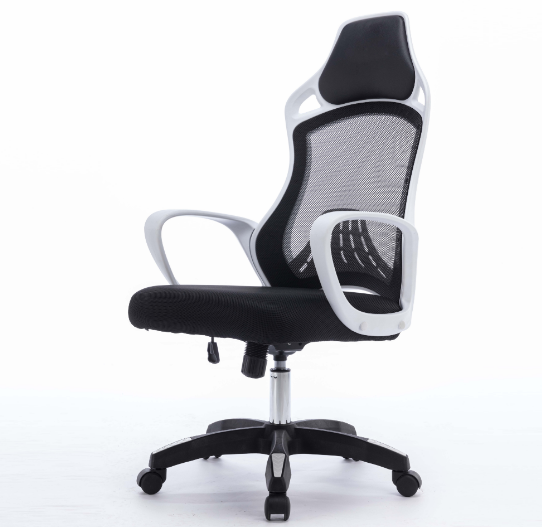Fabric Vs. Mesh Office Chairs: The Great Debate
Dec. 04, 2024
A common question for those seeking a new office chair is: mesh or fabric? Which material is better for a task chair?
Both fabric and mesh office chairs come with their own set of advantages and disadvantages that can impact your choice. While both can be excellent options for ergonomic office chairs, the decision ultimately hinges on the quality of the materials, the manufacturer, and the design.
As experts in comfortable office chairs, Anji is here to provide insights that will help you optimize well-being and productivity in the workplace.
Let’s explore the nuances of office chair selection and the various options available to you.
What Is Mesh?
Mesh fabric is a lightweight material characterized by an open-weave or net-like structure, created by interlocking yarns or fibers in a loose pattern. This design results in a breathable and flexible textile commonly used in various applications, including clothing, accessories, and especially office chairs.
Often referred to as power mesh, tulle, or powernet, this robust and breathable fabric is typically made from durable synthetic materials such as polyester, nylon, or spandex.
What Is Fabric?
There are various types of fabric materials and textiles used for upholstering office chairs, with the most common being nylon, polyester, and their blends. These materials are favored for their stain resistance and durability.
In office chairs, the foam cushion is typically layered, shaped, and adhered to the fabric. Foam density can vary; denser foam tends to be firmer and more durable.
Different fabrics offer varying levels of comfort and breathability, and the choice of fabric can greatly influence the chair's appearance, quality, and ease of cleaning, making the selection process for a task chair challenging.
Pros of Mesh Office Chairs
Mesh offers numerous advantages, making it a favored choice for ergonomic seating.
Breathability
Mesh allows for excellent air circulation, preventing heat build-up during extended sitting, which enhances comfort and keeps you cool.
Flexibility
The flexible nature of mesh conforms to your body’s contours, providing support and evenly distributing weight to reduce pressure points. It moves with you, maintaining support during micro-movements.
Improved Posture
Quality mesh office chairs support different parts of the body and back, promoting better posture.
Anti-Slip
Many mesh office chairs feature anti-slip properties, ensuring you remain securely seated without sliding forward or down.
Durability
High-quality mesh is resistant to wear and tear, particularly seat sagging, promising a longer lifespan even in high-traffic environments.
Modern Aesthetics
Mesh chairs have a contemporary, sleek design available in various colors, adding a modern touch to office spaces and creating an airy feel rather than a heavy appearance.
Easy Maintenance
Mesh chairs are easy to clean; stains and spills can be wiped away quickly, and they dry fast, allowing for immediate use.
Ergonomic Adjustability
These chairs often include adjustable features such as seat height, depth, tilt, armrests, and lumbar support, enabling customization for optimal comfort. A headrest can further enhance the seating experience.
Environmentally Friendly
Some mesh materials are recyclable, supporting sustainability in office furniture production.
Anti-Static
Made from materials like polyester and nylon, mesh office chairs often have anti-static properties, reducing concerns about static electricity around sensitive electronic equipment.
Cons of Mesh Office Chairs
While mesh offers many benefits, there are some drawbacks to consider:
Low Quality
Some mesh materials can be low-quality, leading to abrasiveness or issues like sagging and tearing over time.
Less Padding
Mesh chairs typically have less padding compared to traditional upholstered options, which may be a downside for those who prefer a softer seating experience during their workday.
Less Traditional Appeal
Although mesh chairs are modern and practical, they may not suit those with traditional office decor. Additionally, some models come in limited designs, colors, and textures, making it difficult to find a perfect match for every workspace.
Cost
High-quality mesh chairs can be pricier than traditional upholstered chairs, which may influence some buyers' choices.
Limited Insulation
Cheaper mesh options often lack the insulation properties of foam-filled upholstery, making them feel colder in winter months.
Potential for Snagging
The open design of mesh can make lower-quality chairs more susceptible to snagging on clothing or jewelry, potentially leading to damage.
Pros of Fabric Office Chairs
Fabric remains a popular choice in workplace settings, offering several key advantages:
Comfort
Fabric chairs typically feature foam filling, providing a soft and comfortable seating experience. The upholstery adds a cushioned feel, making them a preferred option for many.
Versatility
Available in a wide array of colors, patterns, and textures, fabric allows for diverse design options. This versatility makes it easy to match chairs to your office decor and aesthetic.
Insulation
Fabric provides excellent insulation, particularly in colder environments, as it retains heat, resulting in a cozier seating experience.
Stain Resistance
Many manufacturers treat their fabrics to be stain-resistant and easy to clean. While fabric may not be as easily cleanable as mesh, it is still a practical choice in environments where spills are likely.
Aesthetic Appeal
Fabric chairs often boast a classic and professional look, making them suitable for traditional office settings and contributing to a more formal appearance.
Ergonomic Adjustability
Fabric chairs often include hidden adjustable ergonomic features, such as inflatable lumbar support, allowing for customization to enhance comfort and support.
Cost-Effective Options
Fabric chairs tend to be more budget-friendly than some high-end mesh or leather alternatives, making them popular for home offices and small businesses where cost is a significant consideration.
Wide Availability
Fabric office chairs are widely accessible, making them a go-to option for businesses and individuals seeking affordable seating solutions.
Cons of Fabric Office Chairs
While fabric chairs have many advantages, they also come with notable drawbacks:
Harder to Clean
Despite some fabrics being stain-resistant, they are generally more susceptible to stains than mesh. Cleaning can be more challenging due to the foam filling, and spills may leave lasting marks.
Design Limitations
The bulkiness of foam cushioning can limit the adjustability of some fabric chairs, potentially sacrificing important ergonomic features such as seat slide, forward tilt, or back height adjustment. Prioritizing features that enhance posture and blood flow is crucial when selecting an office chair.
Durability
Fabric chairs may show signs of aging, wear, and tear over time. Upholstery can fade, fray, or wear in high-use areas, affecting aesthetics. Additionally, foam filling can compress, leading to uncomfortable cushions and fabric bunching.
Breathability
Compared to mesh, fabric offers less breathability, making it less comfortable in warmer environments due to reduced air circulation.
Allergen Accumulation
Fabric can trap allergens like dust and pet dander, which may cause discomfort for allergy sufferers. Regular cleaning and maintenance are essential to mitigate this issue.
Weight
Fabric chairs are often heavier than mesh chairs, which can affect portability and ease of movement.
Odor Retention
Fabric and foam can absorb and retain odors over time, especially after spills or accidents, making it challenging to eliminate unpleasant smells, particularly in communal workplaces.
Potential for Fading
Depending on the fabric quality and exposure to sunlight, colors may fade over time, impacting the chair's overall appearance.
Mesh vs. Fabric: The Final Verdict
Choosing between a mesh chair and a fabric chair ultimately depends on the quality of the chair and your specific needs. Mesh office chairs are an excellent option for busy workplaces with high traffic, as they are durable, easy to clean, and designed to support the body’s natural contours.
Conversely, fabric office chairs may be a better fit if you have a tighter budget or are seeking a specific aesthetic. However, keep in mind that they tend to wear down more quickly, can trap allergens, and may feel warmer during the summer months.
If you're in the market for an ergonomic mesh office chair, consider a Comfort Seating chair. Our designs are ergonomic and suitable for a wide range of users, regardless of height, shape, or weight.
84
0
0


Comments
All Comments (0)